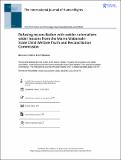Files in this item
Refusing reconciliation with settler colonialism : wider lessons from the Maine Wabanaki-State Child Welfare Truth and Reconciliation Commission
Item metadata
| dc.contributor.author | Collins, Bennett | |
| dc.contributor.author | Watson, Ali | |
| dc.date.accessioned | 2022-11-08T18:30:01Z | |
| dc.date.available | 2022-11-08T18:30:01Z | |
| dc.date.issued | 2023-02-01 | |
| dc.identifier | 256290341 | |
| dc.identifier | 7fd970fa-5519-42d5-bafe-f9cac68dec2c | |
| dc.identifier | 85140086083 | |
| dc.identifier | 000868219200001 | |
| dc.identifier.citation | Collins , B & Watson , A 2023 , ' Refusing reconciliation with settler colonialism : wider lessons from the Maine Wabanaki-State Child Welfare Truth and Reconciliation Commission ' , The International Journal of Human Rights , vol. 27 , no. 2 , pp. 380-402 . https://doi.org/10.1080/13642987.2022.2131771 | en |
| dc.identifier.issn | 1364-2987 | |
| dc.identifier.other | ORCID: /0000-0002-5801-825X/work/121312027 | |
| dc.identifier.uri | https://hdl.handle.net/10023/26337 | |
| dc.description.abstract | The Maine Wabanaki-State Child Welfare Truth and Reconciliation Commission (MWTRC) is one of the more recent examples of the truth and reconciliation model being used in a settler colonial context. This article argues that the MWTRC highlighted a historical and continued refusal by Wabanaki people to ongoing systems of white settler violence especially in the form of Native child welfare. Examining the MWTRC through the lens of refusal allows for a critical analysis of the ways in which the MWTRC subverts neoliberal reconciliation models that leave colonial structures unchallenged and unchanged. The MWTRC, as a process founded and led by Wabanaki and settler social workers and Wabanaki survivors of the child welfare system, actively refused reconciliation with settler colonialism. Instead it sought a process predicated on a relationship that accepted the realities of historical and continued oppression of Wabanaki people and sought long-term transformative change for Wabanaki people. Relying on two years of conversations between the authors and the community of Wabanaki and settler individuals who initiated and partook in this process, this article offers an analysis of the MWTRC and how its strategy of refusal denied settler colonial co-option of a Wabanaki-centred process. | |
| dc.format.extent | 23 | |
| dc.format.extent | 1898896 | |
| dc.language.iso | eng | |
| dc.relation.ispartof | The International Journal of Human Rights | en |
| dc.subject | Reconciliation | en |
| dc.subject | Settler colonialism | en |
| dc.subject | Truth and reconciliation commissions | en |
| dc.subject | Refusal | en |
| dc.subject | Indigenous | en |
| dc.subject | Child welfare | en |
| dc.subject | JZ International relations | en |
| dc.subject | T-NDAS | en |
| dc.subject | SDG 16 - Peace, Justice and Strong Institutions | en |
| dc.subject | AC | en |
| dc.subject | MCC | en |
| dc.subject.lcc | JZ | en |
| dc.title | Refusing reconciliation with settler colonialism : wider lessons from the Maine Wabanaki-State Child Welfare Truth and Reconciliation Commission | en |
| dc.type | Journal article | en |
| dc.contributor.institution | University of St Andrews. School of International Relations | en |
| dc.identifier.doi | 10.1080/13642987.2022.2131771 | |
| dc.description.status | Peer reviewed | en |
This item appears in the following Collection(s)
Items in the St Andrews Research Repository are protected by copyright, with all rights reserved, unless otherwise indicated.

